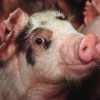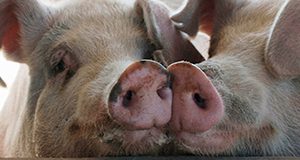This 8-page document discusses common biological, chemical, and physical hazards that may need preventive measures during the manufacture of swine feeds. Written by Taylor Langford, Morgan McKinney, Chad Carr, and Jason M. Scheffler, and published by the UF/IFAS Department of Animal Sciences, September 2019.
http://edis.ifas.ufl.edu/an357
Tag: Swine Feed and Nutrition
Feeding Ensiled Citrus Pulp to Finishing Pigs (AN282)
 For the past six years, feed costs have continually increased and Florida has greater feed costs than the rest of the country because grain must be shipped here from where it was produced. But the Florida pork producers generally get prices above market value for their pigs because of strong demand for locally-raised foods. These Florida pork producers could become more profitable if they could significantly decrease their production costs. In Florida, pork producers have an opportunity to use citrus byproducts as a feedstuff to substantially and sustainably decrease their feed costs. This 4-page fact sheet was written by J. D. Crosswhite, N. B. Myers, A. T. Adesogan, J. H. Brendemuhl, D. D. Johnson, and C. C. Carr, and published by the UF Department of Animal Sciences, August 2012.
For the past six years, feed costs have continually increased and Florida has greater feed costs than the rest of the country because grain must be shipped here from where it was produced. But the Florida pork producers generally get prices above market value for their pigs because of strong demand for locally-raised foods. These Florida pork producers could become more profitable if they could significantly decrease their production costs. In Florida, pork producers have an opportunity to use citrus byproducts as a feedstuff to substantially and sustainably decrease their feed costs. This 4-page fact sheet was written by J. D. Crosswhite, N. B. Myers, A. T. Adesogan, J. H. Brendemuhl, D. D. Johnson, and C. C. Carr, and published by the UF Department of Animal Sciences, August 2012.
http://edis.ifas.ufl.edu/an282
AN124 Guideline for Using Alternative Feedstuffs for Livestock
Revised! AN124, a 5-page fact sheet by Robert Myer and Travis Maddock, provides a list of considerations for producers who are currently using or plan to use alternative feedstuffs in their livestock operations. Includes references. Published by the UF Department of Animal Sciences, December 2009.
http://edis.ifas.ufl.edu/AN124
AS44/AN036 Types of Swine Diets
Revised! AS-44, a 6-page fact sheet by Joel Brendemuhl and Bob Myer, provides an overview of the particular nutrient requirements of various classes of swine. Published by the UF Department of Animal Science, September 2009.
http://edis.ifas.ufl.edu/AN036
